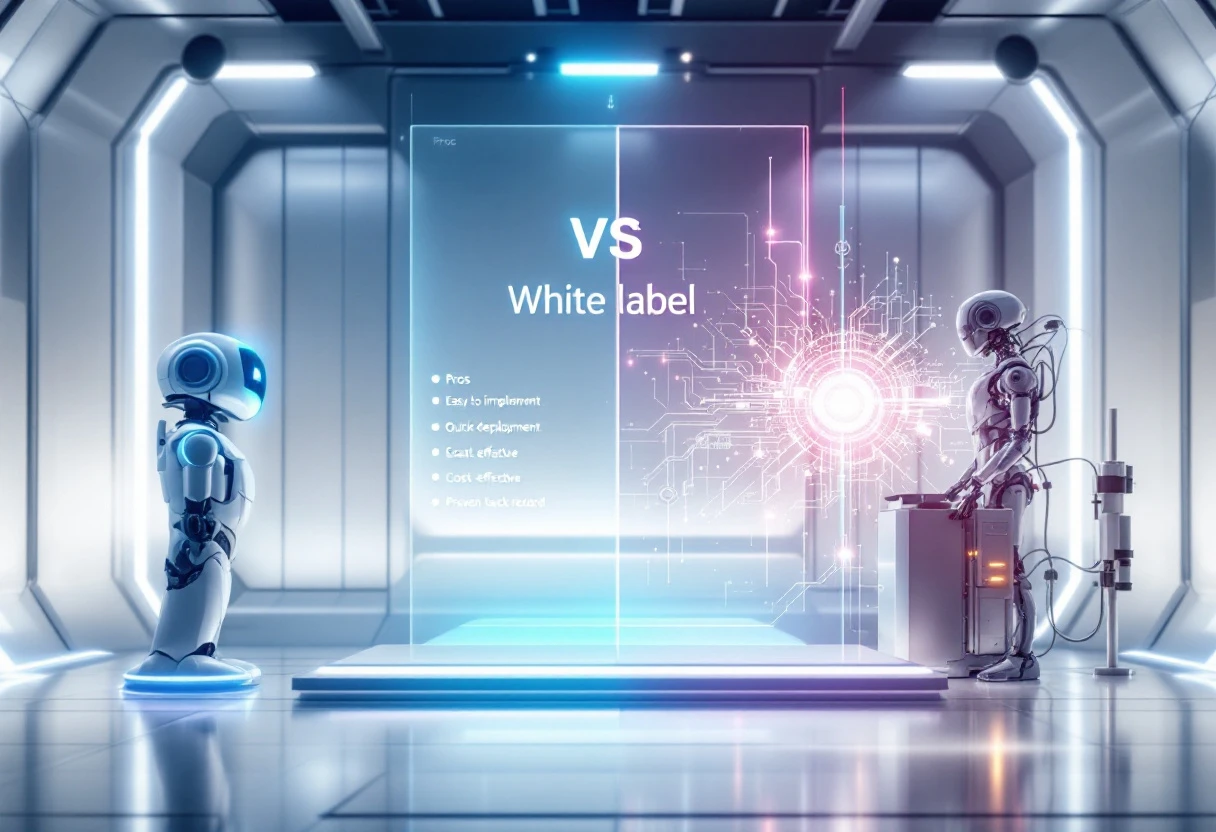
Are you looking to elevate your customer service experience and improve engagement? Exploring the differences between white label and custom AI receptionist solutions can help you make informed decisions that align with your business needs. Understanding how these technologies work, their benefits, and implementation strategies will empower you to enhance customer interactions and generate more leads effectively.
AI receptionists are automated systems designed to manage front-line customer interactions. They can handle tasks such as answering frequently asked questions, scheduling appointments, and routing calls to the appropriate departments. This technology aims to enhance customer service by providing instant responses and freeing human staff for more complex queries.
The evolution of AI in customer service has progressed significantly over the past decade. Initially, simple chatbots were the norm, responding to basic inquiries. Now, sophisticated AI systems can understand natural language, recognize speech, and provide personalized experiences driven by data analytics. As a result, businesses are increasingly adopting AI receptionists to enhance customer engagement and satisfaction.
Studies reveal that companies utilizing AI receptionists see a marked improvement in customer satisfaction. For instance, a survey found that organizations implementing these systems reported a 30% increase in positive customer interactions. This boost stems from the ability of AI to provide 24/7 availability and quick resolutions to common issues.
Real-life case studies illustrate the success of AI receptionist implementations. For example, a small retail chain integrated an AI receptionist to manage customer inquiries. Within three months, they recorded a 25% reduction in call handling times and a 40% uplift in customer feedback scores. This demonstrates how effective AI deployment can improve both efficiency and customer perceptions.
“AI receptionists are transforming customer interactions, making them more efficient and personalized.” - Industry Expert
Businesses considering the integration of AI receptionists often have several questions. Key considerations include:
Data points suggest that businesses investing in personalized AI systems can see a return on investment within the first year. Studies indicate that AI receptionists can decrease operational costs by over 20% annually due to reduced staffing demands calculated through various evaluations.
For detailed guidance on the hosting and technological aspects needed to deploy AI receptionists, refer to implementation guides. This background will illuminate efficient processes and troubleshooting techniques, helping businesses maximize their chatbot systems.
Ultimately, understanding the differences between white label vs custom AI receptionists is crucial for businesses looking to enhance their customer service while boosting sales leads. For organizations seeking effective solutions, AI Front Desk provides tailored options to suit various business needs.
The White Label AI Receptionist Reseller Program opens doors for individuals and businesses to rebrand advanced customer service technology as their own. This platform gives you the flexibility to customize the AI receptionist to match your brand identity, allowing you to offer a seamless experience to your customers. For small businesses or startups looking for a way to enhance sales leads without hefty investments, this program provides an advantage with just a minimal commitment of handling five receptionist accounts.
By becoming a reseller, you gain access to a state-of-the-art system that combines efficiency with personalization. This hands-off approach reduces operational complexity, letting you focus on core business strategies, such as client acquisition and retention. In fact, companies experiencing an integrated AI solution report a 30% increase in customer engagement within the first three months of implementation.
The path to success in the reseller program is paved with robust support and resources. AI Front Desk ensures that you are not alone in this endeavor. Comprehensive training modules guide you on how to utilize the system effectively and market the service to potential buyers. Businesses are often overwhelmed by the sales process, but with provided tools and strategies, taking the initial steps becomes manageable. Learning about sales strategies in this context can significantly elevate effectiveness.
"AI will shape the future of customer interactions, allowing businesses to truly know and serve their clientele." - AI Expert
Investing in a white label solution vs. custom AI alternatives comes with distinct advantages. The initial costs for a custom system can magnify quickly due to the extensive development cycles. In contrast, entering the AI Front Desk program requires a much lower entry threshold, making it suitable for those exploring a low-risk business model.
Here are a few notable benefits:

To put the program into perspective, consider a small marketing agency that offered traditional reception services. Once they adopted the white label AI receptionist system, they not only enhanced their service quality but also saw a 50% increase in client satisfaction within the first quarter. Such results underscore the potential of integrating advanced tech solutions into existing business structures.
In summary, navigating the decision between white label and custom AI receptionist solutions requires careful evaluation of your goals. The AI Receptionist Reseller Program from AI Front Desk not only reduces the complexity and cost but also provides thorough support as you rebrand and sell this innovative technology. Your focus may well shift from simply selling a service to building a brand known for outstanding customer support.
Custom AI receptionists can transform the way businesses handle customer interactions. Unlike off-the-shelf solutions, they are designed to meet specific needs, adapting to your brand’s tone and nuances. This flexibility allows for a more tailored response to customer inquiries, ultimately improving user experience and satisfaction.
For example, a small law firm might require its AI receptionist to provide detailed legal information based on unique case types, while a retail store may want it to focus on product inquiries and shopping assistance. By customizing the AI’s capabilities, businesses can ensure its functionality aligns perfectly with their goals.
Custom receptionists also allow full integration into existing systems, such as customer relationship management (CRM) tools, which can optimize lead tracking and follow-ups. As a result, companies can reduce the lag time in responding to inquiries, leading to enhanced sales opportunities. Consider examining the advantages of AI in customer service for additional insights.
The decision between white label vs custom AI receptionist often hinges on investment. While white label solutions may promise quick deployment, they come with limitations in customization. On the other hand, custom receptionists typically require a more significant upfront investment but offer a long-term return by aligning precisely with business needs.
Setup time for custom AI can vary based on the complexity of requirements. Simple configurations might take a few weeks, while more intricate systems could span several months. A recent survey found that 60% of businesses saw a return on investment within the first six months of implementing a custom AI solution, underscoring the potential financial benefits.
Understanding the long-term benefits of investment versus immediate costs is crucial for making the right choice for your business. For instance, reviewing cost-benefit analysis of AI solutions can provide clarity.
While custom AI receptionists bring many advantages, they also come with challenges. Initial implementation can be complex, often requiring dedicated internal resources and expertise to ensure smooth integration with existing systems. Organizations may need to assign specialized staff to manage the project, which can divert resources from other tasks.
“The success of an AI implementation hinges on understanding both the technical and human factors involved.” - Industry Expert
Ongoing management of custom AI systems also demands attention. Regular updates and monitoring are essential to keep responses accurate and aligned with current business practices. Companies should be prepared for a continuous learning curve as the technology evolves.
As you weigh the pros and cons of a custom solution, it’s crucial to consider internal capabilities. Assessing implementation challenges in AI can provide further guidance.
In summary, the choice between white label vs custom AI receptionist isn't simply about cost. It's about understanding your business's unique needs, potential return on investment, and your team's ability to support an advanced AI system effectively. For a hands-on experience, explore how a company like AI Front Desk can assist in tailoring a reception solution for your business.
Before making a decision on whether to invest in a white label vs custom AI receptionist, it's crucial to identify your specific business needs. Consider factors such as customer volume, type of interactions, and the current customer service infrastructure in place. A simple assessment could involve:
For instance, a business that receives a high volume of customer inquiries may benefit greatly from a virtual receptionist solution. Conversely, a company with specialized needs might prefer a custom implementation that can integrate with their unique processes. Understanding these elements leads to a clearer choice between standardized solutions and tailored experiences.
Both white label and custom AI receptionists come with their sets of pros and cons. Here's a quick look:
| Criteria | White Label AI Receptionist | Custom AI Receptionist |
|---|---|---|
| Cost | Lower initial investment | Higher cost due to customization |
| Implementation Time | Faster setup | Longer development cycle |
| Flexibility | Less customizable | Highly adaptable to specific needs |
| Scalability | Generally scalable | Scalable based on your design |
It's essential to weigh these factors against your long-term business goals. For example, a startup looking to establish its brand might find a white label solution sufficient initially, while an established company aiming for niche markets might opt for a tailored AI receptionist to better serve its clientele.
Your decision should also consider projected growth and how quickly you might scale up your operations. With market research indicating that businesses with effective AI solutions can improve sales leads by up to 30%, aligning your customer service technology with future goals is vital. Think about:
For instance, a growth-oriented business planning to enhance its service portfolio may benefit from a custom AI receptionist that can expand functionalities as needed. On the other hand, if immediate cost savings and quicker deployment is a higher priority, a white label solution might be more appropriate.
Ultimately, you stand to gain insights by integrating a well-chosen AI receptionist into your business strategy. Whether you go for a standard or customized solution, understanding your specific requirements will guide you toward boosting your sales leads effectively.

"AI receptionists have transformed our customer interaction strategy, giving us the ability to capture leads even when we're not physically available!"

Before making a choice between a white label vs custom AI receptionist, it's essential to assess your specific business needs. Are you looking for a solution that can easily fit into your existing branding, or do you need something that is tailored entirely to your unique requirements? A white label option offers the advantage of quick implementation with minimal customization, allowing you to present a cohesive brand image rapidly. In contrast, a custom solution can provide specific features and functionalities designed to meet your precise operational demands.
Consider conducting an internal analysis. Evaluate how your current processes work. For example, if your goal is to enhance customer interaction, investing in the features of AI receptionists could be beneficial. Look at how much time your team currently spends on calls and the potential for improved efficiency.
The decision between white label and custom AI receptionists can significantly impact your sales leads and overall customer experience. A study conducted by the Gartner Group indicated that businesses utilizing AI for customer service see a 30% improvement in response times. This emphasizes the need to choose wisely, as faster response can directly correlate with increased sales.
For example, small to medium-sized enterprises often benefit from a white label solution—ideal for those less familiar with tech integration. On the other hand, larger corporations with specific requirements might find that a custom solution scales better to their needs.
Some key benefits to consider:
Once you have narrowed down your choices, the implementation phase begins. Here are the steps to consider:
“The best technology is the one that solves the problem while feeling seamless for the user.” - Industry Expert
This highlights the importance of usability in your selection process. Whether you opt for a white label or custom solution, maintaining a focus on user experience will drive better results.
For further insights, consider reviewing case studies related to AI implementation in businesses similar to yours. This could provide valuable lessons learned and help refine your approach.
Ultimately, your decision should reflect your business objectives, budget constraints, and customer service expectations. Choosing the right AI receptionist, whether white label or custom, can significantly improve sales leads and customer satisfaction, setting the stage for greater success. Explore your options further at AI Front Desk to see what best meets your needs.
An AI receptionist is a software tool designed to handle customer interactions. This technology provides quick answers to common questions, schedules appointments, and guides calls to the right department, enhancing customer service.
A white label AI receptionist allows businesses to use existing technology under their brand name with limited customization. A custom AI receptionist is tailored specifically to meet a business’s unique needs and has deeper integration options.
AI receptionists can improve customer satisfaction by providing instant responses and being available 24/7. They help reduce wait times, ensuring that customer inquiries are addressed quickly, which often leads to a better overall experience.
Benefits include enhanced customer engagement, reduced operational costs, improved response times, and the ability to capture leads effectively. Many businesses also report higher customer satisfaction rates after implementation.
Implementation time can vary. White label solutions usually have a faster setup, while custom AI receptionists may take several weeks to a few months, depending on the complexity and features required.
Most providers offer ongoing support, including training, software updates, and customer service assistance to help businesses adapt to the AI system and ensure continued effectiveness.
Start your free trial for My AI Front Desk today, it takes minutes to setup!






